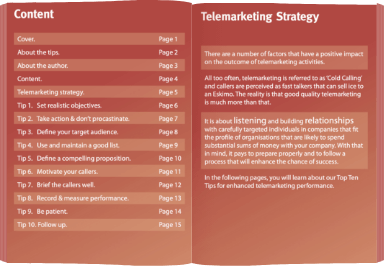If you want to do a good job when it comes to B2B Telemarketing, the first thing you should probably do is to ditch your script. Whilst that’s possibly a strange way to start a blog about Essential B2B Telemarketing Script Writing Tips, to a large extent, it’s true. Scripts sound like, well, scripts. And, from a human relationship standpoint, the more natural you sound, the better. And, the better you sound, the better your results will be.
A Well-Crafted Approach is Vital
So, what to do? In the world of B2B telemarketing, having a well-crafted introduction can make all the difference to achieving a successful outcome. It serves as a blueprint for engaging prospects, conveying your message, and ultimately closing deals. However, scripting goes beyond mere words on a page. An effective approach includes an understanding of:
- Target industry
- Buyer personas
- Call structure
- Tonality
- Pace
- Customer challenges/pains
- The best way to scope your core proposition
- Understanding benefits
- Market triggers
- Timing
And, it’s essential to avoid stiffness in your delivery. If you get the above right, you can enhance your lead generation effort,s and boost your conversion rates from conversation to desired outcome.
Structure is Everything
The structure of your telemarketing is crucial in capturing and maintaining the attention of your prospects. By organising your initial approach effectively, you create a logical flow that shapes the conversation, and ensures your key points are communicated clearly in a way that doesn’t turn off prospects from the get-go. According to recent studies, telemarketing approaches with a well-defined structure can increase conversion rates by up to 20%.
When I run telemarketing training, I always emphasise that the best way to do outbound calling is to not sound like a telemarketer! So, understand the nature of your call, respect your customer’s precious time, and work on the points above. If you do that, when you deliver your intro, you will sound more at ease. That’s especially important in those all-important first few seconds of the call which determine whether the call will proceed.
Start with a Strong Opening
This is probably the most vital element of your call. If you fail at this point, the chances are that the call won’t last long. Prospects are busy. They may have had lots of similar ‘sales’ calls in the past days or weeks, all pitching their wares. So, you need to get to the point fast. And, what you say needs to be interesting.
To grab your prospect’s attention right from the beginning, craft a compelling opening statement that conveys value. Start by addressing their pain points, or challenges, and offer a solution. Statistics reveal that a captivating opening can boost engagement by up to 30%.
Emphasise Benefits, not Just Features
Customers need to quickly understand that you care. They don’t want to be sold to, and certainly not something they don’t need or that isn’t top of their priority list. So, you need to swiftly engage and capture their attention.
Highlighting the benefits of your product or service, in a customer-centric way, is crucial for maintaining your prospect’s interest. Instead of simply listing what your product does, emphasise how your solution can address their specific needs. Provide tangible advantages and examples. Reference similar customers of situations.
Studies indicate that 70% of B2B decision-makers are more likely to engage with telemarketers who focus on benefits.
Avoiding Stiffness
The way you deliver your telemarketing script significantly impacts how prospects perceive your message. Adopt a conversational tone. Few people like to be pitched at. Maintaining a conversational tone throughout your call helps build rapport. Avoid sounding robotic. This can create a disconnect and decrease the chances of building a relationship.
Research shows that telemarketers who adopt a conversational tone achieve 40% higher conversion rates.
Find the Right Pace
Anxious telemarketers typically go one of two ways. Either, they clam up and struggle to get their words out in a logical order that makes sense. Or, they bombard prospects with a stream of words like a jet-wash. Maintaining an appropriate pace during your telemarketing call is essential.
Relax. Speak clearly, and avoid rushing through your script, as it may leave prospects feeling overwhelmed. They will switch off fast. Conversely, speaking too slowly can make you sound bored (and boring), and detached. As a consequence, this may be the impression your prospects gain of your company. Finding the right balance contributes to a more enjoyable conversation, and better results.
Studies indicate that telemarketers who match their pace to the prospect’s rhythm have a 35% higher degree of success.
Avoid Sounding Rehearsed
Sounding ‘over-rehearsed’ can put off prospects and hinder your chances of success. Of course, there are some sectors where compliance is compulsory, where regulation dictates the approach. But, outside of these areas, try to avoid sounding too slick, like you’ve rehearsed a monologue that you’re desperate to deliver in its entirety.
Instead, be natural and spontaneous. Allow room for improvisation within the script to adapt to the prospect’s responses.
According to surveys, 75% of B2B decision-makers appreciate telemarketers who can think on their feet and adjust their conversation accordingly.
Understand Pain
There’s plenty of evidence that people are more likely to buy when they’re in a distress situation. In other words, when they need to urgently find a solution to a pressing problem. That doesn’t mean you should adopt a sleazy, arch-salesperson, style of presentation. However, pain is a compelling motivator. Remember that, at the same time, you need to show you care, and that you’re calling at least with their interests in mind.
However, illustrating that other similar companies, or similar roles to theirs, have found solutions to their pressing issues, by working with you, is a much better stance. It’s much less likely to trigger the phone going down.
Conclusion
The word ‘script’ may strike fear into the hearts and minds of high quality organisations that sell high value products and services. The personal approach generally wins out when it comes to big ticket sales. But, that doesn’t mean that successful telemarketers just wing it, and rely only on their experience and intuition. Effective callers plan their strategy. They know their stuff. Experience tells them what works. Yet, they don’t assume they always know the answer. They understand that one size doesn’t fit all. They are open to exploring change when change is necessary.
Crafting an effective telemarketing script is therefore a skill that requires a good understanding of your target audience, and mastery of tone, pace, and structure. By following the tips outlined in this blog, you can significantly enhance your telephone technique. Remember, a well-crafted structure with a conversational tone, appropriate pace, and an avoidance of stiffness can pave the way for successful B2B telemarketing campaigns. Embrace these strategies, adapt them to your unique business needs, and watch your conversion rates soar.






